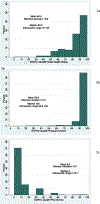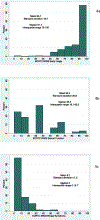Patient-Reported Outcomes 10 Years After Breast-Conserving Surgery for Early-Stage Breast Cancer
- PMID: 39048900
- PMCID: PMC11416309
- DOI: 10.1245/s10434-024-15876-8
Patient-Reported Outcomes 10 Years After Breast-Conserving Surgery for Early-Stage Breast Cancer
Erratum in
-
Correction: Patient-Reported Outcomes 10 Years After Breast-Conserving Surgery for Early-Stage Breast Cancer.Ann Surg Oncol. 2024 Dec;31(13):8933. doi: 10.1245/s10434-024-16315-4. Ann Surg Oncol. 2024. PMID: 39352560 No abstract available.
Abstract
Background: Patient-reported outcomes (PROs) are a critical component of value-based care. Limited data exist describing long-term PROs in patients undergoing breast-conserving surgery (BCS).
Patients and methods: Patients undergoing surgery for stage 0-III breast cancer at our institution from 2002 to 2012 who agreed to be contacted were invited to participate in a cross-sectional PRO study. Health-related quality of life outcomes using BREAST-Q, EORTC QLQ-C30, and EORTC QLQ-BR45 were collected. Patients reporting chemotherapy within 6 months of receiving the survey were excluded. For this work, we focused on patients who underwent BCS. Multivariable linear regression was performed to identify factors associated with PRO scores, adjusting for age, time since surgery, anatomic stage, molecular subtype, receipt of systemic and/or radiation therapy (RT), locoregional recurrence, or contralateral breast cancer.
Results: Among 562 interested and eligible patients, 437 (78%) responded; median time from surgery to survey completion was 10.4 years (interquartile range: 8.0-13.5). Median age at surgery was 53 years (standard deviation 9.8 years), ≥ 90% were white, had upfront surgery for early-stage disease, and completed adjuvant RT. Physical and psychological well-being scores were generally high, with more variation seen for sexual well-being and satisfaction with breasts.
Conclusion: This study provides long-term PRO data for patients treated with BCS, demonstrating the ongoing association of breast cancer surgery with quality of life in the survivorship period and highlighting the importance of examining PROs beyond the perioperative period. These data also provide important reference values for the interpretation of PROs among women treated with BCS as we move towards value-based care.
Keywords: Breast cancer; Breast-conserving surgery; Patient-reported outcomes; Quality of life; Survivorship.
© 2024. Society of Surgical Oncology.
Figures




References
-
- American Cancer Society Breast Cancer Advisory Group. Breast Cancer Facts & Figures 2022–2024.. 2022. Accessed March 10, 2023.
-
- Veronesi U, Cascinelli N, Mariani L, et al. Twenty-year follow-up of a randomized study comparing breast-conserving surgery with radical mastectomy for early breast cancer. N Engl J Med. Oct 17 2002;347(16):1227–1232. - PubMed
MeSH terms
Grants and funding
LinkOut - more resources
Full Text Sources
Medical
Miscellaneous

